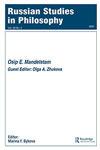卡尔萨文《宗教形而上学》中的完美概念
IF 0.1
4区 哲学
Q4 Arts and Humanities
引用次数: 0
摘要
完美的概念是卡尔萨文形而上学中的一个关键概念,它在很大程度上决定了卡尔萨文对人格及其本体论地位的理解。从他的《历史哲学》到他的专著《论完美》(写于他在阿贝兹集中营生活的最后一年),与之相关的完美人的概念贯穿了这位思想家的整个哲学时期。在本文中,我认为完美的概念是卡尔萨文的宗教哲学体系的主要结构元素,使其在本体论上充实和完整。我相信基督教关于人在上帝中的完美的观念,卡尔萨文在尼古拉斯·库萨的完全统一体系和弗拉基米尔·索洛维约夫的神性观念中发现的哲学变体,既是最初的智力直觉,也是思想家形而上学建构的本体论前提。他的宗教哲学著作延续了俄罗斯文化的精神传统,在那里,教父思想认为理想是人在追求完美上帝的过程中精神上的超越。这种福音思想成为卡尔萨文的基督教人格学和他的历史形而上学的中心结合元素,这是在形而上学的脉络中解决的。本文章由计算机程序翻译,如有差异,请以英文原文为准。
The Concept of Perfection in Lev Karsavin’s Religious Metaphysics
ABSTRACT This article examines the concept of the perfect, a key idea in Lev P. Karsavin’s metaphysics that largely determines his understanding of personhood and its ontological status. The associated concept of the perfect person develops throughout the entire philosophical period of the thinker’s work, from his Philosophy of History to his treatise “On Perfection,” written in the last year of his life in the Abez’ camps. In this article, I argue that the concept of perfection is the main structural element in Karsavin’s religious–philosophical system, making it ontologically full and complete. I believe the Christian idea of the perfection of man in God, philosophical variations of which Karsavin finds in Nicholas of Cusa’s system of total unity and Vladimir Solovyov’s idea of Godmanhood, is both the initial intellectual intuition and the ontological premise of the thinker’s metaphysical constructions. His religious–philosophical work has a continuity with Russian culture’s spiritual tradition, where patristic thought of man considers the ideal to be the spiritual transcendence of the person in his striving toward the Perfect God. This evangelic idea turns out to be the central binding element both of Karsavin’s Christian personology and of his metaphysics of history, which is resolved in a metaphysical vein.
求助全文
通过发布文献求助,成功后即可免费获取论文全文。
去求助
来源期刊

RUSSIAN STUDIES IN PHILOSOPHY
PHILOSOPHY-
CiteScore
0.10
自引率
0.00%
发文量
14
期刊介绍:
Russian Studies in Philosophy publishes thematic issues featuring selected scholarly papers from conferences and joint research projects as well as from the leading Russian-language journals in philosophy. Thematic coverage ranges over significant theoretical topics as well as topics in the history of philosophy, both European and Russian, including issues focused on institutions, schools, and figures such as Bakhtin, Fedorov, Leontev, Losev, Rozanov, Solovev, and Zinovev.
 求助内容:
求助内容: 应助结果提醒方式:
应助结果提醒方式:


